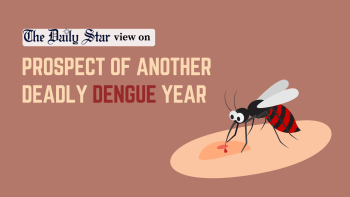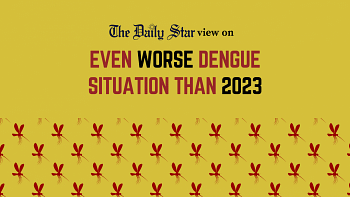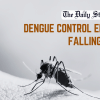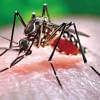Managing dengue hotspots can be the difference between life and death

After 2023, which turned out to be the deadliest year on record in terms of dengue in Bangladesh, there was a feeling that things couldn't get any worse, that we had hit rock bottom. But barely five months into 2024, that feeling is beginning to evaporate as rock bottom appears to be still some distance away. By May 28, according to the Directorate General of Health Services (DGHS), 2,795 dengue patients were hospitalised and 35 died in the country, compared to 13 deaths in the same period last year. This points to a potential repeat—or more likely an exacerbation—of the 2023 outbreak, which had claimed 1,705 lives.
Further fuelling this assumption is a recent survey by the DGHS that revealed a disturbing increase in the presence of Aedes mosquito larvae in Dhaka, where most of the infections and fatalities are usually recorded. According to the survey, a high density of Aedes larvae has been found in 29 wards of Dhaka South City Corporation (DSCC) and 12 wards of Dhaka North City Corporation (DNCC). It means that residents in 41 out of the 99 wards surveyed are at high risk, a number that will rise as the monsoon approaches. And if dengue data is collected from both government and private hospitals this year—as the DGHS said it would—year-end figures would no doubt shoot through the roof.
All this certainly makes for depressing reading. However, the authorities have so far shown no sense of urgency that the situation demands. Early efforts to destroy mosquito breeding grounds have been lacklustre, haphazard, and unmotivated. There has even been a misguided sense of complacency as displayed by the DSCC mayor who, against evidence, claimed "success" in their fight against dengue last year. Moreover, the government is yet to form a scientific, comprehensive response plan befitting a disease that now poses a threat round the year. It is yet to introduce an integrated vector management system to enable proper interventions.
Clearly, we need an urgent course correction. A large part of the fight against dengue is preventing the breeding of Aedes mosquito, and the government must double down on this going forward. Experts have suggested hotspot management across the country, focusing on the addresses of dengue patients. This will require proper collaboration among the relevant agencies including DGHS and city corporations.


 For all latest news, follow The Daily Star's Google News channel.
For all latest news, follow The Daily Star's Google News channel. 










Comments